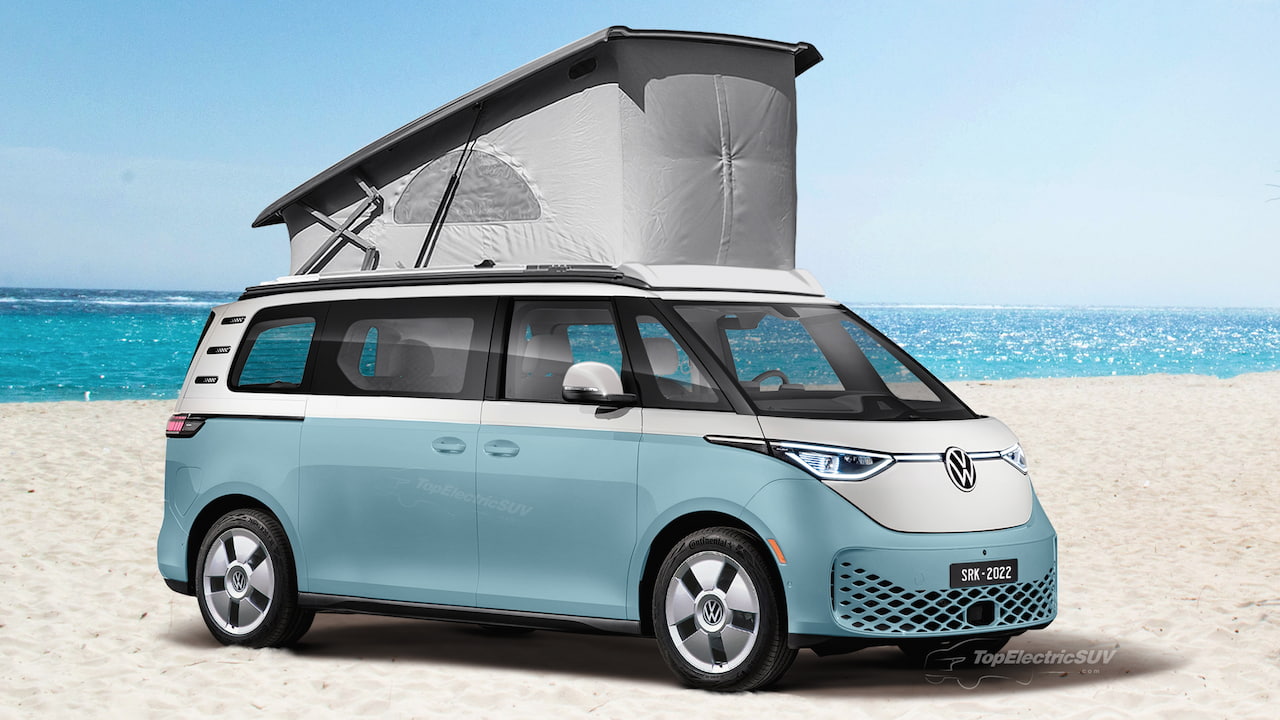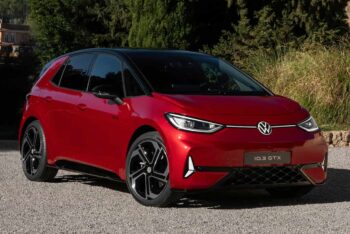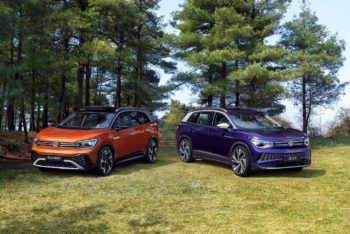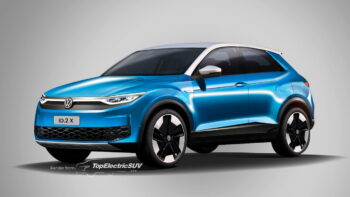Update (March 20, 2024): ‘Dvan ID. Buzz Campervan’ sub-section added to ‘Unofficial VW ID. Buzz Campervan coming in 2024.’
Volkswagen Commercial Vehicle (VWN)’s product plans include the launch of a pure-electric campervan – the VW ID. California. As you must’ve guessed, we’re talking about a VW ID. Buzz California, meaning the campervan will be a conversion of the ID. Buzz.
Development start & reported delay
In a press announcement on December 9, 2021, the Volkswagen Group confirmed a new electric vehicle derivative called VW ID. California, stating that the board had approved the capital expenditure for the new project. It was referring to the campervan version of the ID. Buzz.
At VWN’s annual press conference in March 2023, the future leisure-oriented version of the electric van earned a mention during the CEO’s presentation:
We’re introducing the fully-electric ID. Buzz with a long wheelbase this year, and with the long wheelbase model the campervan will return to the North American Market.
Carsten Intra, CEO of Volkswagen Commercial Vehicles, at the Annual Press Conference of Volkswagen Commercial Vehicles 2023, on March 23, 2023.
While things appeared to be progressing, the ID. California has hit a roadblock in the development because of weight, as per a report Edison Media released on August 8, 2023. It’s safe to assume that VWN will want the electric campervan to pack similar or perhaps better features compared to the gasoline-powered California. However, if it doesn’t one-up the combustion model and comes with identical equipment, the electric campervan would weigh at least 3,000 kg (6,614 lbs.).
Considering the driver, passengers, and luggage, this weight might surpass the limit set for a European class B driver’s license, potentially requiring customers to obtain a class C (truck) driving license. VWN would have to delay the release of the ID. California until it secures battery cells with a higher energy density, to be able to sell it like a regular ID.Buzz.
However, Mark Gillies, the Director of PR and Reputation at Volkswagen Group of America, told Carscoops that reports about the appreciable delay in the ID. California’s development “is incorrect.” He didn’t share anything regarding the status of the electric campervan project, though, or even the scheduled SOP or release date.
We’ll update this section as and when new information emerges, but until then, let’s take a look at the rest of the details reported so far.
Design
At a 2023 Car of the Year event, Kai Grünitz, BoM member responsible for Technical Development, Volkswagen Commercial Vehicles, said that a concept version of the VW ID. California is in the works, Autocar said in a report it released on January 12, 2023.
It seems the design work for the VW ID. Buzz California has begun at the Walhalla, the top-secret Volkswagen Design Center in Wolfsburg, Germany. We already have a fair idea of how it will look. The picture you see in this story is our depiction of a U.S.-spec VW ID. California beach camper.
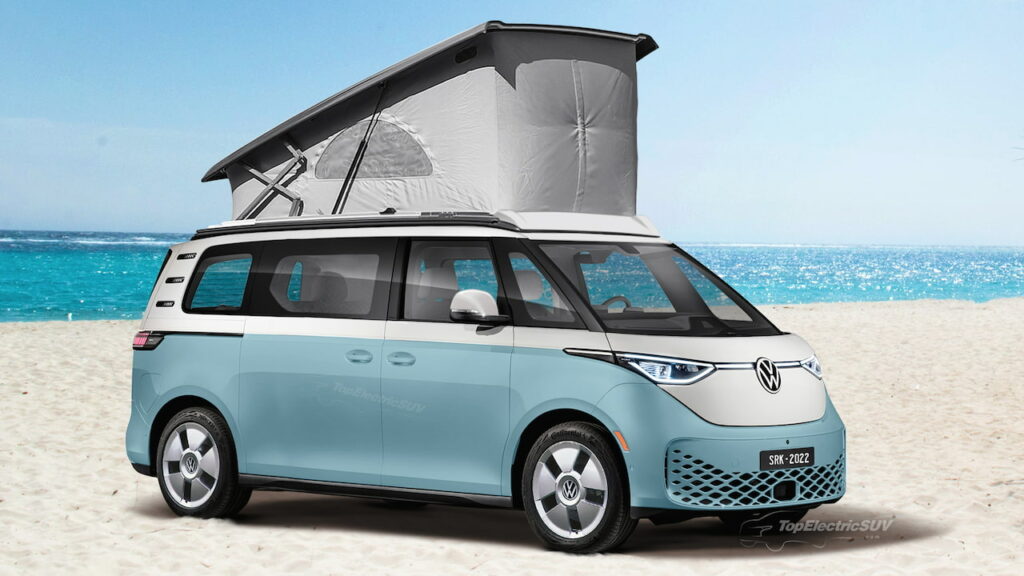
The pure-electric campervan we’ve rendered has a wheelbase longer than the Euro-spec ID. Buzz that went on sale in 2022. We’ve painted the future model in a baby blue color that would make it feel right at home when driven to pristine Californian beaches. The campervan that we have derived from the ID. Buzz passenger van flaunts exclusive alloy wheels as well. It has an electrically operated pop-up roof that creates a generous upper berth for a second sleeping enclosure.
Expected Features & Specifications
The VW ID. California is expected to offer IQ.Light HD matrix headlights, a 14-inch touchscreen infotainment system, a head-up display, ID. Light, and other similar features from the current ID. EV models. Its camping equipment may include swiveling front seats, an elevating roof with an electro-hydraulic elevating roof with panorama opening, a mini-kitchen, cupboards, a table, folding chairs, a bench cum bed, a loft bed, a touch-operated camper control unit, etc. Volkswagen may offer the ID. California in 4-, 5-, 6-, and 7-seat versions.
We’re expecting the electric campervan to be available in 282 hp RWD and 330 hp AWD variants, both with an 85 kWh (net) battery pack. The battery pack should support charging at up to 200 kW, with a 5-80% session taking just around 30 minutes. Plug and charge support and bidirectional charging capability will likely be standard.
Depending on the configuration selected, the ID. California should deliver an EPA-est range of 225-260 miles.
Price & Release date
In an interview with German publication Automobilwoche, published in September 2022, Volkswagen Commercial Vehicles CEO Carsten Intra discussed the VW ID. California release date. According to Intra, the electric campervan will arrive after the next-generation California (derived from the T7 Multivan). The VWN boss said that the company will discontinue the T6.1 California in 2024 and that there could be a short vacuum after that.
If VWN is indeed grappling with technical challenges, as reported by Edison Media, the launch of the electric campervan could take until the second half of the decade. The German media report states that while sales commencement could be delayed, the project would not be abandoned.
What’s also certain from Intra’s words is the electric campervan will co-exist with the gas-powered California campervan. The company has already confirmed that it will produce the new derivative alongside the existing ID. Buzz models in Hannover, Germany.
We expect prices of the VW ID. California to start north of USD 70,000.
Unofficial VW ID. Buzz Campervan coming in 2024
Roadsurfer ID. Buzz Campervan
Roadsurfer, one of Europe’s biggest motorhome and campervan hire companies, plans to start offering a ID. Buzz Campervan much earlier than Volkswagen. The German outdoor travel specialist has 5,000+ vehicles in its fleet, more than half of which are from VWN, and in 2023, it acquired two units of the ID. Buzz to start development of its in-house campervan.
Roadsurfer is building two units of the ID. Buzz Campervan, one in Munich and one in Frankfurt. After extensive testing, the company will start making the ID. Buzz Campervan in high numbers to add it to its rental fleet in 2024.
One of the test units will be equipped with Ququq’s BusBox-4, which includes a bed, kitchen, water supply, and storage space. The other unit will be furnished with Vanessa’s ID. Buzz sleeping system, which includes a sleeping area, kitchen system, and storage space. Both vehicles will have a solar panel as well. Lucky Roadsurfer employees will get to test the electric campervan in the coming weeks, probably a year or more before customers can start renting it.
Dvan ID. Buzz Campervan
UK-based Dvan has introduced an unofficially converted VW ID. Buzz Campervan, available for direct order or as a modification service for existing ID. Buzz vehicles. The campervan accommodates five people for seating and sleeps four comfortably.
Dvan installs the ID. Buzz Campervan with a 130-watt solar panel and a 3,000-watt inverter to power the retrofitted equipment. It features a pop-top elevating roof (incorporating the solar panel), awning rails, a space-efficient fold-up bed, a pull-out kitchen, a fold-up table, and a shower tap.
Additionally, the campervan includes a slide-out Beach Box powered by a 1 kWh battery pack with a 1,800-watt output. It offers power for charging devices or running appliances and includes a 1,000-watt induction hob, a sink, a tap, a removable 15-liter fridge, a water tank, and lift-up storage. On a full charge, Dvan’s ID. Buzz Campervan offers a range of over 215 miles.
TopElectricSUV says
Car buyers are increasingly switching to zero-emission vehicles (such as hatchbacks, sedans, and SUVs), and it’s time recreational vehicle owners follow suit. While it may not be for everyone, the ID. Buzz California will allow many adventurers to enjoy their leisure activities in an eco-friendly way, and in more comfort and convenience without having to upgrade to a larger vehicle.
Also See: The GMC Hummer EV EarthCruiser is one versatile electric camper truck
Featured Image Source: TopElectricSUV.com’s rendering of the VW ID. California.
An automobile engineer by training, I’ve analyzed the global car market since 2005, with a keen focus on EVs since 2008. My journey in online automotive publishing spans 16 years, during which I have reviewed cutting-edge automotive technologies and interviewed leading CEOs and vehicle developers from around the world.
